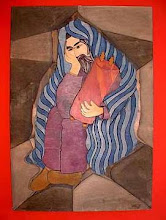Year 143 BC. King Antiochus governed the kingdom of Syria under an oppressive rule that forbade every religious confession other than a pagan religion. The People of Judea was part of this kingdom and firmly resisted the orders of the tyrant. Mattathias, son of Jonathan and leader of the Jews, headed the resistance and would never allow his people to relinquish its own laws and deepest beliefs. From this moment onwards, the mountains that protected the sun from the oppression of this fanatic king became a shelter for the Jewish people, ready to fight for a non-negotiable value: Freedom!
The triumph obtained by the Jewish people with Mattathias and his sons Yehuda, named "The Maccabi", Jonathan, Simon and Judah, who was elected High Priest to replace his father, turned the Maccabies into a living myth.The Maccabies, the great fighters who advocated life, freedom and the human spirit, are a source of inspiration for our people. . . .
http://www.panamericanos2007.org/en/contenidos.php?categoria=15&seccion=1
Yehudah Hamaccabi
Judah Maccabee
(killed 160 BCE)
Second leader of the Judean revolt against the Greco-Syrian empire [166 BCE]. Westerners have traditionally referred to the third son of Mattathias of Modein by the Latinate form of his name: Judas Maccabeus. A Judean priest, he assumed command of Judean resistance to Greek forces after his father's death [165 BCE]. His defeat of the Greek governor of Samaria led to even more stunning victories over larger Greek armies at Beth-horon & Emmaus. After this, Judah captured Mt. Zion, purged the temple of Hellenistic cult paraphernalia, reconstructed the sanctuary according to Torah prescriptions and reconsecrated it to the worship of YHWH [Dec. 164 BCE]. The festival of Channukah was later instituted to commemorate this triumph. Judah was repelled, however, in his attempt to drive the Syrian garrison from the rest of Jerusalem and was defeated near the village of Beth Zechariah, southwest of Jerusalem [162 BCE]. He died in the battle of Elasa (north of Jerusalem). Though Judah himself never held an official political position other than ad hoc general of the Jewish rebellion, he had a major influence on the direction of later history by initiating an alliance with the republic of Rome against the Greek Syrian empire. He was succeeded by his youngest brother Jonathan who, like him, left no male heirs. But the descendents of his older brother Simon became the Hasmonean dynasty of Judean rulers.
http://www.jewishvirtuallibrary.org/jsource/biography/maccabee_judah.html
BNI READERS: Post your best insult about Islam and/or the Prophet Mohammed
-
Get creative. Foul language alone isn’t. Post drawings, photos, poems,
songs, videos, cartoons, animated gifs, etc. This is in response to this
latest vide...
2 hours ago


.jpg)

















No comments:
Post a Comment